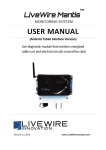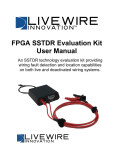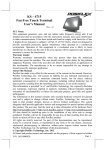Download Power Prowler User Manual
Transcript
Power Prowler TM UsER MANUAL 3-In-1 DMM/TDR Cable Fault Finder for Energized and Unenergized Cables LW-PLR600 LW-PLR600AV Revison 08/19/13 TM LiveWireInnovation.com Power Prowler TM 3-In-1 DMM/TDR Cable Fault Finder for Energized and Unenergized Cables User Manual Table of Contents About the Power Prowler............................................................................3 Features and Functions...........................................................................3 Physical Features.....................................................................................3 Optional Accessories...............................................................................4 Safety Information...................................................................................5 Power Prowler Description......................................................................6 Terms and Descriptions...........................................................................7 Types of Faults..........................................................................................7 General Operations..................................................................................8 On/Off.....................................................................................8 Automatic Power Down...........................................................................8 System Settings..........................................................................................9 Digital Multimeter Options (DMM)...........................................................11 Fault Location (TDR Operation)................................................................14 To Begin Test for Fault Location.............................................................14 Fault Location Display............................................................................15 Functions........................................................................................15 Changing VOP Values............................................................................16 Calibrating VOP Values..........................................................................16 Favorites......................................................................................18 Conducting a Test...................................................................................19 Live Event Detection.................................................................................20 Run a Live Event Detection Test..............................................................20 Maintenance.............................................................................................21 Batteries...........................................................................................21 Cleaning..............................................................................................21 Storage........................................................................................21 Customer Service......................................................................................22 Specifications......................................................................................23 Patents/Intellectual Property....................................................................25 Warranty Information...............................................................................26 Registration........................................................................................26 Disposal........................................................................................26 Returns........................................................................................26 2 ABOUT THE POWER PROWLER The Power Prowler is used to accurately measure voltage and resistance as well as to test voice, data, and video cables. The Power Prowler determines cable length, identifies cable faults, and quickly discovers the Velocity of Propagation (VOP) for a cable using patented Spread Spectrum Time Domain Reflectometry (SSTDR). Feature Function Works on both energized and unenergized cables Discover cable events, including those which can only be shown under load Digital Multimeter Prowler measures DC voltage, AC voltage, continuity, and resistance Fault Location Quick picture of existing cable faults and condition Displays length reading in feet or meters International applications Live Event Detection Monitors the cable for events (faults) Physical Features Feature Function Large color LCD display Easy to see in all lighting environments Compact form factor Usable in tight spaces Bench top, handheld, or hung up Easy to use for field flight line and production work Banana style interface Connects to many types of systems Uses 6 AA batteries (included) Provides power for 20 to 30 hours Multilingual English, French, or Spanish 3 Power Prowler Your Power Prowler comes in two different kits and has optional accessories available. Part Number LW-PLR600 Description ▪ Power Prowler Main Unit ▪ DMM Meter Leads 600V CAT III ▪ Leader Cable: 5 feet 600V CAT II ▪ Flanged Crocodile Clips: red and black 600V CAT III ▪▪BNC (F) to Double Banana Plug ▪▪BNC (M) to F Connection (F) ▪▪Hanging Pouch ▪ Power Prowler main unit ▪ DMM Meter Leads 600V CAT III ▪ Leader Cable: 5 feet 600V CAT II LW-PLR600AV ▪ Flanged Crocodile Clips: red and black 600V CAT III ▪▪ Multi-pin Adapters ▪▪ BNC (F) Double Banana Plug ▪▪ BNC (M) to F connection (F) ▪▪ Hanging pouch Optional Accessories Part Number Description LW-CA009 Cable Assembly, Power Cord to 3 Banana Plugs 300V LW-AD006 Multi-pin Adapter 1000V CAT III LW-CA002 BNC (M) to Alligator Clips 4 safety Information To ensure safe operations of the Power Prowler, follow instructions carefully and observe warning and caution messages in this manual. Failure to observe warnings can result in severe injury or death and can damage the equipment. Notification Definition Warning: Potential for personal injury. Caution: Potential for damage to or destruction of equipment. Voltage! Voltage detection: Voltage on cable is unsafe or exceeds safety maximums. Conformité Européenne. Conforms to European Economic Area directives. Disposal information ▪ Do not use the Power Prowler or Power Prowler accessories if they appear damaged or the unit is not working properly. ▪ Do not use with voltages higher than the Power Prowler’s rated voltage (600V). ▪ Use with caution with voltages greater than 30V AC RMS, 42V AC peak, or 60V DC. ▪ Disconnect circuit power and discharge high-voltage capacitors when testing capacitance, continuity, diodes, or resistance. ▪ Do not use around explosive or flammable gas. ▪ Use only test leads approved by a safety agency that have the same voltage, amperage, and category as the Power Prowler. ▪ Before opening the battery door, remove leader cables. ▪ Always wear personal protective equipment when working with the Power Prowler. ▪ Use caution when handling the probes and cable connections on the Power Prowler when the Voltage! icon is present. 5 Power Prowler Description On the LCD screen, three main functions are displayed Warning LEDs 1. Multimeter Battery life LCD display screen 2. Fault Detection 3. Live Event Detection Keypad Function keys Settings Live Event Detection Test Multimeter Fault Location Back (to previous screen) Enter Up/down arrows Left/right arrows Power On/Off The four soft keys below the screen operate each of the four functions on the screen (just above each key). The following graphics appear only in home screen mode: Banana jack connectors 6 Terms and Descriptions Table 1 defines the terms used throughout the document and provides information to assist with proper operation and understanding of the unit and its functions. Table 1. Terms and Descriptions Terms Description and Uses Velocity of Propagation (VOP) Speed of electric signal traveling through a cable; measured as a percentage of speed of light Safety Extra Low Voltage (SELV) International Electrotechnical Commission rating; defines safe voltage standards of electronic devices (60 volts DC or Peak AC; 45 volts RMS) Spread Spectrum Time Domain Reflectometry (SSTDR) Spread Spectrum Time Domain Reflectometry (SSTDR) is a measurement technique to identify faults, usually in electrical wires, by observing reflected spread spectrum signals. Types of Faults Table 2 defines two possible error conditions on a cable; Short and Open. All detected cable faults will appear on the test results screen of the Power Prowler. Table 2. Types of Faults Terms Description and Uses Open Wire connection is not continuous throughout cable length Short Two or more wires in a cable are connected (short circuit) 7 General Operations Follow instructions carefully and pay attention to warning and caution symbols. Failure to observe warnings can result in damage to the Power Prowler or cause severe injury or death. On/Off ▪▪Turn unit on/off—press the red Power button . Automatic Power Down ▪▪The Power Prowler automatically dims the backlight and powers off to conserve battery power if no input or activity is performed on the device. Press the Setup soft key to adjust the length of time before the LCD screen dims and power off timeout. 8 System Settings A setting is selected by pressing the up and down arrow keys. The currently selected setting is indicated by the left and right arrow icons appearing beside the function and the value of the function being highlighted with a green background. Use the left and right arrows to change the settings. To save any settings changed, press the Save soft key or to exit without saving, press the Cancel soft key . ▪▪Automatic Power Off – Automatic power off is adjustable between 5 and 30 minutes in 1 minute increments. ▪▪Backlight Dimming – The dimming of the backlight to save power can be set between 1 and 9 minutes in 1 minute increments. Pressing a key restores the backlight to full brightness. ▪▪Audio/Visual Alerts – The alert signal is used by the DMM continuity mode to indicate a low resistance. Various combinations of the buzzer and LED are available – low frequency buzzer (B1), high frequency buzzer (B2), B1 plus the alert LED (B1+LED), B2 plus the alert LED (B2+LED) or LED only (LED). An example of the alert is activated when selecting a different alert setting. ▪▪Feet/Meters and Leader Cable - The length units and leader cable settings are selected by this function to either: ▪▪Feet with no leader cable ▪▪Feet with a 5 foot leader cable ▪▪Meter with no leader cable m ▪▪Meters with a 5 foot leader cable m . 9 ▪▪Power Line Frequency (DMM) - Use the Left/Right buttons to toggle between 50 and 60Hz power line frequencies. Set to the local line frequency to reduce noise sensitivity to power lines. ▪▪Language – English is the default language selected. Use the left and right arrow keys to select either French, Spanish, or English. ▪▪Saving changes - Once the settings have been adjusted to the user’s satisfaction, press the Save button to save the settings. ▪▪To cancel your settings: Either press Cancel at any time and return to the previous screen , or by pressing the Back button . ▪▪Back button always returns to the previous screen whether it is the home screen or one of the test modes. 10 Digital Multimeter Operations (DMM) The Digital Multimeter Mode of the Power Prowler measures DC voltage, AC voltage, continuity, and resistance. For voltage and resistance, the Power Prowler will provide a measurement as well as minimum and maximum values. Using the Multimeter to turn the unit on. ▪▪Press the red Power button ▪▪Connect the appropriate adapter(s) for your application to the Power Prowler, and then connect to the cable under test. ▪▪Select the Multimeter icon by pressing the Left/Right buttons, then or press the DMM soft key . press the Enter button ▪▪Using the Left/Right buttons, cycle through the DMM functions to read each measurement [Direct Current (DC) Voltage, Alternating Current (AC), Low Impedance Alternating Current (LoZ AC), Continuity, and Resistance (Ohms)]. ▪▪DC mode measures direct current input voltage. ▪▪AC mode measures the RMS (root mean square) value of alternating current voltage. ▪▪LoZ AC or Low Impedance AC Mode sets input impedance to about 1,000 Ohms and measures the RMS value of alternating current voltages. This reduces the chances of false readings due to probes picking up AC voltage before they are connected to the test circuit. ▪▪Continuity Mode identifies continuity by measuring the resistance between input probes and displays either OL (overload) for 11 an open circuit or Low Resistance (LO). Maximum resistance to detect continuity is 250 Ohms. ▪▪Resistance Mode measures and displays resistance between input probes. The display shows real-time input unless you press Hold or Min/Max. When input exceeds your presently selected range, the letters OL (overload) appear. When your input is out of range or over 60V (AC or DC), the high voltage warning sign appears, alerting you to a potentially hazardous voltage. All DMM modes display a bar graph that approximates the percent of the full range of the function selected. Common Voltage Mode Functions The following common voltage mode functions are used when DC Voltage, AC Voltage, or Low Impedance have been selected (see above). ▪▪Hold (freezes display at current measurement) ▪▪Press the Hold soft key to freeze the display. The word Hold appears in red on the screen. ▪▪Press the Hold soft key to resume real time measurement. ▪▪Range (manually select a Range or use the automatic range Auto Range). The range is displayed to the lower right of the measurement. ▪▪Press the Range soft key repeatedly to cycle through Manual Range options or Auto Range. ▪▪Auto Range is the default. Ranges available are: 0-4V, 0-40V, 0-400V, and 0-600V. ▪▪Min/Max (displays maximum and minimum values, as well as average value) ▪▪Once range and the desired voltage measurements have been selected, press the Min/Max soft key to display minimum/ maximums. If a new high or low measurement is encountered, the Min/Max display changes. ▪▪To display an average measurement, press the Average soft key (which changes to Min/Max). An average value will be displayed and change according to continuing real-time input. ▪▪Press the Hold soft key to freeze the display. The word HOLD will appear on the screen in red. 12 ▪▪Press the Hold soft key to resume real-time displays. ▪▪Press the Restart soft key to reset the AVG and VDC or VAC readings and display new inputs. ▪▪Press the Min/Max soft key to switch back to the Min/Max mode. ▪▪Pressing the Restart soft key will restart the accumulation of Max/Min readings in the Min/Max mode. ▪▪Press the Back button to exit Min/Max and return to the normal voltage display screen. to exit the current DMM function and ▪▪Press the Back button return to the home screen. 13 Fault Location (SSTDR Operation) The Power Prowler determines the length of a variety of cable types and calculates the VOP of a cable with known length. When connecting to a cable, use proper adapters for the application. When connecting to energized cables over 60V, you will need the leader cable (CA008) rated at 600V CAT III. If a leader cable is being used, the should be selected for a more leader installed option accurate length reading. See Setting Options for more information on leader settings (page 9). Internal Power Prowler components are protected to 600V peak AC or DC. Connecting the unit to cabling with voltages above 600V peak AC or DC may damage the unit and pose a safety hazard for the user. To Begin a Fault Location Test ▪▪Press the red Power button to turn the unit on. ▪▪Connect the proper adapter for your application to the Power Prowler, and then connect to the cable under test. Select the Fault Location icon by pressing the Left/Right buttons, then press the Enter button or press the Fault Location soft key . ▪▪Use the Left/Right buttons to scroll to the cable type being tested. The cable type appears on the bottom of the screen. ▪▪Press the Test button to measure the length of the cable or the distance to a fault. 14 Fault Location Display ▪ Press the red Power button to turn the unit on. ▪ Connect the proper adapter for your application to the Power Prowler, and then connect to the cable under test. Select the Fault Location icon by pressing the Left/Right buttons, then press the Enter button or press the Fault Location soft key . ▪ Use the Left/Right buttons to scroll to the cable type being tested. The cable type appears on the bottom of the screen. ▪ Press the Test button to measure the length of the cable or the distance to a fault. Test leads being used Battery Life Mode Indicator Valid length indicator Cable Fault (open or short) Cable Type & VOP Favorites bookmark Settings Calibration Functions The following functions are used by pressing tthe appropriate soft key or button. - activates favorites screen to select or bookmark ▪ Favorites cable types and VOPs. ▪ Calibration - activates calibration to calculate VOP for existing cable. ▪ system options - access system options such as length units (feet or meters). ▪ Left/Right Arrow Buttons - press to select cable type. ▪ Up/Down Arrow Buttons - press to adjust VOP value. ▪ Back - exit length mode and return to main screen. 15 ▪ The left/right cursor buttons scroll through preset cable types and VOP values (as well as values you may have saved). This list includes generic names (Custom Cable 1, for example) used to save custom VOP values. ▪ When performing a test, the valid length indicator (=) appears on the top left portion of the screen. This shows that the displayed length is based on a current cable type and VOP. The indicator is removed if the cable type and/or VOP have changed until another test has been performed. Changing VOP Values In the fault location mode, you can adjust the velocity of propagation (VOP) value for any cable and save your adjustment. ▪ Check to see if your Power Prowler is in the correct Leader/No Leader setting (see system settings page 9). ▪ Press the Up/Down buttons to change the VOP. The digits that are changed will be displayed in grey. Hold the button down to repeat/ scroll. ▪ A red Edit label appears on the screen when the first up/down button is pressed. ▪ Press the Test button to measure the cable with the new VOP value. ▪ Press the Default soft key to return to the default VOP for the current cable type. ▪ Press the Return soft key to exit editing with the current VOP value. This does not update the cable type with the new VOP value. ▪ Press the save soft key to save your new VOP value for your current cable type and exit editing. ▪ Press the Cancel soft key to restore the VOP value you had before editing and return to the main Fault Location display screen. Calibrating VOP Values To find the VOP value with a known length of cable: ▪ Press the CAL soft key. ▪ A red Calibrate label appears on the screen. ▪ Use the Up/Down buttons to match the known cable length (hold the cursor key down to rapidly change the length). 16 ▪▪Use the +50 or -50 soft keys to increase or decrease the length by 50 feet (approximately 20 meters). ▪▪When calibrating a known cable under 50ft (15m) accuracy will be low. ▪▪Press the Test button to calculate VOP from your known cable length. ▪▪Press the Save soft key to save the results, or to return to the test screen without saving changes . 17 Favorites The favorites screen is accessible by pressing the Favorites soft key A table will appear with six user-selected cable types. . To select a Favorite cable type: ▪▪Press the Up/Down buttons to scroll and highlight a cable type in the list. to select the highlighted cable type as the ▪▪Press the Enter button current cable type and return to the Fault Location screen. To edit the favorites list: ▪▪Press the Favorites soft key . ▪▪Select one of the 6 locations on the table using the Up/Down buttons to highlight a desired row in the table. ▪▪Use Left/Right buttons to locate a cable type to store in the highlighted row of favorites or press the + soft key to add the current cable type to the selected favorites slot. Press the Trash Can soft key to clear the highlighted row. ▪▪The table contents are bookmarks to cable types (if you change the VOP for a cable type, the table is updated automatically). ▪▪Press the Save soft key to save your changes. ▪▪Press the Cancel soft key to discard changes and exit. 18 Conducting a Test Once your VOP and cable type have been selected, you can run a test. ▪▪Press the green Test button to run a Fault Location test. ▪▪The graphic on the left side of the screen will display an open or short condition. Short Open 19 LIVE EVENT DETECTION Live Event Detection monitors a cable for changes. In this mode, the Power Prowler detects, locates, and time stamps the fault. How to run a Live Event Detection Test ▪▪Press the red Power button to turn the unit on. ▪▪Connect the proper adapter for your application to the Power Prowler, and then connect to the cable under test. Use the right arrow button to scroll to the Live Event Detection icon then press the Enter or you can press the Live Event Detection soft key . button ▪▪Use the Left/Right buttons to select the cable type or edit the VOP (as described in Fault Location, on page 15). When editing the VOP you cannot use the Test button to verify the new VOP value. ▪▪Press the Test button to begin testing. On the lower left side of the screen, a timer will appear displaying elapsed time for the test. The Power Prowler will identify any changes (event) to the cable condition (open or short condition). The test will stop when a change is detected or if the cancel soft key is pressed . 20 MAINTENANCE Batteries ▪▪The Power Prowler is powered by 6 alkaline AA batteries. ▪▪When the battery life indicator is flashing, or the onscreen battery life indicator shows only one bar, it’s time to replace the batteries. ▪▪Make sure the Power Prowler is turned OFF. ▪▪Using a Philips head screwdriver, remove the back panel. ▪▪Take the old batteries out and replace with 6 fresh AA batteries. ▪▪DISPOSAL: Batteries are considered hazardous waste. Dispose of them at a hazardous waste facility. Cleaning ▪▪Use a clean, damp cloth to clean the Power Prowler. ▪▪Before cleaning, disconnect all cables from the Power Prowler. Failing to disconnect cables can damage the device and cause personal injury. ▪▪Do not use harsh cleaners, abrasives, or solvents. Storage ▪▪When not in use, store the Power Prowler in a dry, protective case. Batteries should be removed if the device is stored for a long time. ▪▪Do not expose the Power Prowler to high temperatures (above 80°C) or humidity. See the specifications section for temperature limits. 21 CUSTOMER SERVICE For technical information, visit www.livewireinnovation.com. For customer service, email [email protected]. Contact Numbers: Phone: 855-346-3358 Fax: 801-293-8301 Address: 10288 South Jordan Gateway, Suite A South Jordan, Utah 84095 USA 22 SPECIFICATIONS Measurement Technology Spread Spectrum Time Domain Reflectometry U.S. Patents and Patents Pending Multimeter Section Description Range Resolution Accuracy (% + counts) DC Volts 600V 400.0V 40.00V 4.000V 1V 0.1V 0.01V 0.001V ±(0.5% + 2) Auto-ACV LoZ True-rms 600V 0.1V ±(2.0% + 3) DC, 45~500 Hz ±(4.0% + 3) DC, 500~1 KHz AC Volts True-rms 600V 0.1V ±(1.0% + 3) DC, 45~500 Hz ±(2.0% + 3) DC, 500~1 KHz 4.0 KΩ 40.00 KΩ 400.0 MΩ 40.0 MΩ 0.0t01 KΩ 0.01 KΩ 0. 1 KΩ 0.00 1 MΩ 0.01 MΩ Ohms Languages Power ±(0.9% + 2) ±(0.9% + 2) ±(0.9% + 2) ±(0.9% + 2) ±(0.9% + 2) English, French, Spanish 6x AA alkaline batteries, typical battery current: Off mode - 4.25 uA Multimeter mode: 81 mA with backlight, 41 mA dim backlight Fault Location: 82mA - one test per minute with backlight Live Event Detection: 115 mA when active with backlight, 75 mA dim backlight Battery Life 6 x AA alkaline batteries Standby: life of the battery Operating: 20 to 30 hours, mode dependent Batteries are included Maximum Range 12,000 ft (3,657 m) at .999 VOP VOP (%) with 3 digit precision ranging from 20.0% to 99.9% Output Connector Banana Jacks 600V CAT III Leader Cable Cable Assembly, 5 ft. (1.5 m) 600 Volt CAT II, 95 Ohm 23 Altitude 6500 ft (2000m) operating Temperature Operating: 14 to 122°F (-10 to 50°C); Storage: -4 to +140°F (-20 to 60°C) Humidity 10 to 90% non-condensing Enclosure High-strength PC/ABS plastic with V0 rating with boot Size 1.85”H x 3.6”W x 6.8”L (4.7 x 9.15 x 17.3 cm) Weight With batteries: 1 lb 2 oz (510 g) Safety Compliances PENDING: Complies with ANSI/ISA 82.02.01 (61010-1) 2004, CAN/CSA-C22.2 No 61010-1-04, UL 6101B (2003) and IEC/EN 61010-1 2nd Edition for measurement Category II, 600 V, EMC EN61326-1 Warranty 1 Year 24 PATENTS/INTELLECTUAL PROPERTY LiveWire Power Prowler is the trademark of LiveWire Innovation, Inc. and is covered by one or more patents as described at http://livewireinnovation.com/about/patents-trademarks/. 25 Warranty Information LiveWire Power Prowler is covered by the Limited Product Warranty set forth in and subject to the terms, conditions, limitations and disclaimers set forth in LiveWire's General Terms, http://livewireinnovation.com/terms/. No further warranties either implied or express will apply, nor will responsibility for operation of this device be assumed by LiveWire Innovation. Product Registration Registering your Power Prowlerallows you to access support information and receive product updates. Register your products on the LiveWire Innovation website: www.livewireinnovation.com/warranty. Disposal WEEE Compliant: Prior to disposal of this product, please contact LiveWire Innovation for proper disposal options. Returns You must first request a Return Materials Authorization number and receive shipping instructions by contacting the Customer Service Department at 855-346-3358 or by emailing [email protected]. Note: Shipments will not be accepted without this number, which must be clearly marked on the shipping label. 26 Power Prowler TM Power Prowler TM The 21st Century Dual Mode TDR for Testing and Monitoring Energized and Unenergized Cables User Manual TM For technical information and customer support, please visit www.livewireinnovation.com or send an email to [email protected]. Contact Numbers: Phone: 855-346-3358 Fax: 801-293-8301 Address: 10288 South Jordan Gateway, Suite A South Jordan, Utah 84095 USA www.livewireinnovation.com









































